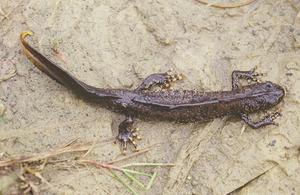Newt conservation and sustainable development in Norfolk and Suffolk
A Natural England licensing scheme is now underway in Norfolk and Suffolk which will help better conserve the UK’s threatened population of great crested newts.

The ‘District Level Licensing’ scheme will create and restore a network of ponds, providing vital habitat across the 2 counties and adding to the characterful wooded countryside of the Suffolk coast and heaths, the wide wetland habitats of the Norfolk broads and beyond.
The scheme works by taking payments from housing and other developers and investing them in 4 times the number of ponds that were impacted by their construction projects.
In the past, landowners or housing developers in Norfolk and Suffolk had to apply for a licence before building on or around the places where newts live. Seasonal restrictions led to delays and uncertainty over the costs and scheduling of planned development.
Now, a ‘landscape-scale’ approach to licensing means that developers can make a simple, straightforward application and payment to join their local, area-wide scheme.
The one-off payment covers the creation, restoration, maintenance and monitoring of ponds in the area for 25 years, in locations specially selected to provide the best habitat for great crested newts. The award-winning, evidence-based scheme will help support and link up local populations of this yellow-bellied amphibian.
The initiative is timely, contributing to the government’s plans to ‘Build Back Greener’ and fuel the UK’s economic recovery, in turn providing social and economic benefits for local communities.
Martin Horlock, Environment Manager, Norfolk County Council, said:
District Level Licencing provides us with a useful tool to help conserve this species, which is threatened throughout its European range. Developers using this approach will bring about lots of high-value, secure ponds for newts which are well managed and monitored for the long term. The scheme offers developers certainty in terms of costs and timescales, and it means developments that have been through planning will not be held up by protracted post-planning licensing.
Hannah Thacker, Natural England Area Manager for Norfolk and Suffolk, said:
This initiative is a fantastic example of how working in partnership at a landscape scale can provide benefits for our largest species of newt, our local communities and other wildlife, as well as reducing the burden for developers – a true win-win.
Norfolk and Suffolk are the latest areas to launch a district level licensing scheme, joining 77 others including Kent, Cheshire, Essex, Shropshire and Greater Manchester. Natural England is working to expand the initiative to 150 local authorities across the country, as part of a programme funded by the Ministry of Housing, Communities and Local Government.
Updates to this page
Published 2 October 2020Last updated 2 October 2020 + show all updates
-
A new photograph has been added
-
First published.